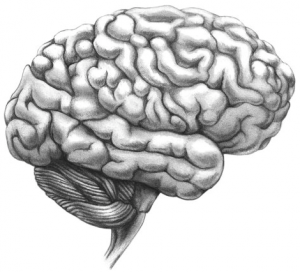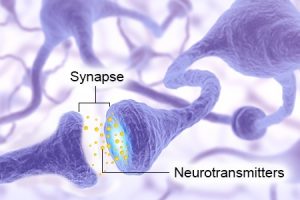When I first saw that TV commercial I thought…
by Michael D. Allen, DC, NMD
Functional Neurologist
There is a television commercial that stops me in my tracks every time I see it. It’s the one about an ingredient originally discovered in jellyfish.
The narrator declares that your brain is an amazing thing, but aging causes the loss of certain brain proteins that leads to a lack of sharpness or trouble with recall. This protein loss affects your ability to learn, retain memories and concentrate, and eventually leads to an unhealthy brain. He goes on to say that this special ingredient actually helps your brain and improves short term memory.
Have you seen this commercial?
Brain Health
Before we go any further, we need to describe what it means to have a healthy brain. From my perspective as a functional neurologist, brain health relates to a nervous system that works according to its original design; one that builds itself up rather than clogs itself up. A healthy brain builds itself up with the right kind of input, but it clogs itself up when that input becomes disorganized.
What is Organized Input?
Your brain controls everything about you. Of all the input that ultimately reaches your brain, the highest priority signals start in your muscles and joints; other signals come from your special senses and organs, and unconscious pain signals that originate in nociceptors. We call this sensory input. Each of these signals has its own distinctive incoming speed. Those signals that arise from the muscles are the fastest and those related to the perception of pain are the slowest. No matter their speed, every one of these signals must mesh perfectly in the brain to generate the proper motor response that makes muscles and organs do their work.
A healthy brain works properly when it efficiently receives and sends its signals according to the nervous system’s original design. When all its signals are timed perfectly, your brain is vibrant, energetic and animated.
However, when your brain’s incoming signals are either neurologically or biochemically disorganized, everything related to your brain’s function is affected. You might experience mental dullness, trouble with your memory or an inability to concentrate as well as you used to. And since your brain itself cannot perceive pain you may think you feel fine. But does simply feeling fine mean you are fine? Brain degeneration is painless.
Brain Proteins
Insofar as nutrition is concerned, healthy brain function requires the right fuel, enough oxygen, and proper movement. Except during times of prolonged starvation, your  brain’s primary fuel choice is glucose. In order to make the right kind of protein to build healthy tissue, your body needs all the amino acids including those that are considered to be essential, as well as beneficial fats, complex carbohydrates and plenty of water.
brain’s primary fuel choice is glucose. In order to make the right kind of protein to build healthy tissue, your body needs all the amino acids including those that are considered to be essential, as well as beneficial fats, complex carbohydrates and plenty of water.
Essentially all neurotransmitters are made up of proteins, and all proteins are made up of amino acid chains. Every protein has a distinctive amino acid sequence, which makes that protein molecule very unique. It is the way these amino acids are linked together that affects brain function.
Neurotransmitters are the biochemicals that relay nerve signals from one nerve to another and the various neurotransmitters are critical for normal brain function. Your brain uses neurotransmitters to let one area know what another area is doing. In the big scheme of things, and depending on how you count them there may be 30 to 100 different neurotransmitter types with 10 of them doing 99% of the work.
Proteins and Aging
As the narrator says, it is true that our body’s natural ability to build new proteins slows down as we age. It is also true that—because some amino acids are harder to consume than others, especially when the diet is less than adequate—the more aged your system becomes the greater the probability that your metabolism will build proteins that were unintended; i.e., metabolic error.
The wear and tear of everyday life takes its toll on our bodies and that toll is paid with amino acids. That is, when conditions change and one amino acid becomes unavailable—for whatever biochemical reason—it is replaced by another amino acid that looks the closest to the one that became missing. A change in the amino acid sequence always modifies that protein’s structure and that changes its function.
New Perspective
To stay healthy your brain needs the right proteins, and this is where my perspective differs from the purely nutritional model. Discovering muscle dysfunction is commonplace in my clinical practice, making the diagnosis of neurological breakdown fairly obvious.
When one muscle does useful work another muscle that does the opposite activity must relax allowing the first muscle to do its work. We call this reciprocity. However, using certain well known physiological reflexes it is quite common to demonstrate a pathological event where some muscles actually do work when they should be quiet and vice versa. This dysfunction represents a breakdown of sensory input.
Cellular Metabolism
Dysfunctional sensory input essentially changes the way proteins are built deep inside the cell’s nucleus. It changes the amino acid sequences, which actually changes the performance of the protein itself. Changing a protein’s structure also changes its function, and these changes actually alter the way the brain works. Over time there is an increased presence of these inappropriate protein molecules, which has a high probability of leading to neurological degenerative conditions like Parkinson’s disease, dementia and multiple systems atrophy.
The healthiest brain proteins can only result from properly organized brain signals that neurologically encourage the cell’s nuclei to produce the rightly constructed proteins along their properly organized biochemical pathways. Simply consuming a jellyfish protein does nothing to heal the root cause of the movement disorders that broke down that highest priority input that mainly comes from muscles, which may have initiated the whole dysfunctional issue. Without resolution, the degenerated metabolic pathways continue to produce unintended chaos inside the human neurologic fabric.
Metabolic Error
The commercial’s narrator says that this new breakthrough supplement helps support brain health by supplying the proteins your body should otherwise be producing. It replaces these proteins in the body and helps protect your brain cells during this natural process of aging.
Metabolic error can happen as the sensory input changes with time, and vice versa. Any irregularity in the usual pattern of muscle activity or behavior will result in changes in cellular metabolism, and that leads to the way proteins are linked inside the nucleus of the cell.
When metabolic error happens you may start to experience difficulty with memory, focus and concentration. Many people describe their mental state as foggy, they may have slow or muddled thinking, or they may feel tired, slightly confused, and/or sleepy feeling in their thought process. They may have difficulty with word or thought recollection, or feel “stoned”. One person described their mental state as a fog or mist around every thought, memory, or any piece of information they are trying to retrieve in their head.
Functional Rehabilitation
Science has shown that normal reciprocal movement is essential for healthy cognition, and that movement can start with a properly coupled chiropractic manual manipulative procedure. This  special adjustive technique has the ability to affect the neurologic and metabolic pathways that change the character of protein production in the nucleus of the cell, which enhances the outcome of the product: proteins.
special adjustive technique has the ability to affect the neurologic and metabolic pathways that change the character of protein production in the nucleus of the cell, which enhances the outcome of the product: proteins.
In conclusion, it seems far more appropriate for your long term health to take care of your nervous system on an ongoing basis. Keep your nerve signals firing at their preprogrammed rate, maintain normal reciprocal movement and monitor your neurological expression by receiving regular chiropractic care from a qualified functional neurologist.



